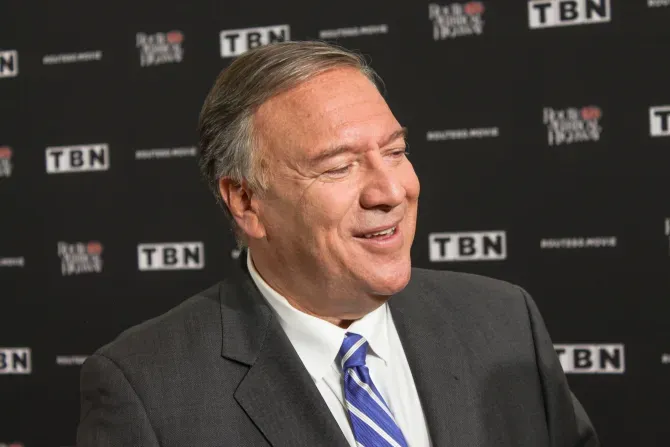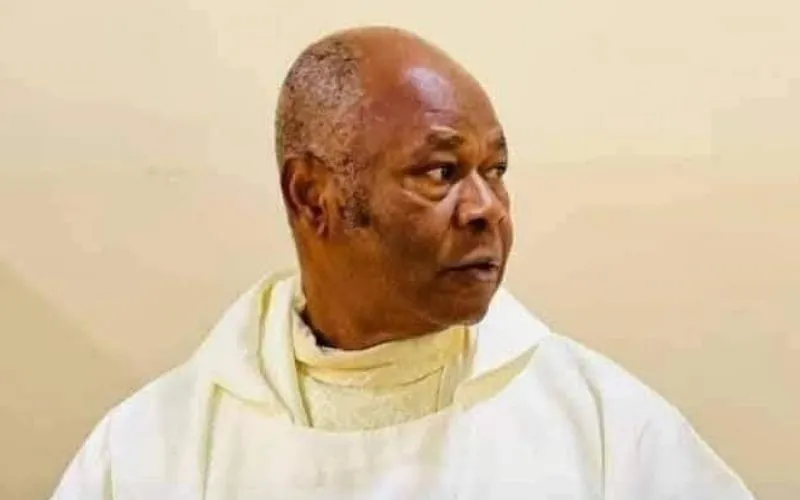“It’s an area of conflict … the West Bank, a nondescript area. And it sort of sounds to most people like some strip of land 6,000 miles away, with people fighting over it for the last couple of hundred years,” Friedman said.
“I want people just to understand that there is massive history here, massive religious significance for Jews and Christians going back to Abraham.”
 Former Secretary of State Mike Pompeo, left, and Former U.S. Ambassador to Israel David Freidman overlooking Jerusalem during the filming of their movie, "Route 60: The Biblical Highway." Credit: Route 60 movie promotional still
Former Secretary of State Mike Pompeo, left, and Former U.S. Ambassador to Israel David Freidman overlooking Jerusalem during the filming of their movie, "Route 60: The Biblical Highway." Credit: Route 60 movie promotional still
The images and sound design of the film are arresting, with the sweeping drone shots, artful illustrations and motion graphics, and booming score that cinema-goers expect from an epic documentary. It includes countless biblical references and passages as well as historical reenactments of biblical events as they are described.
Sites visited in the movie include the Temple Mount in Jerusalem, Rachel’s Tomb, and other places of significance to biblical figures such as Jacob, Joseph, and King David. The hosts also discussed the ecumenical nature of the sites, such as the Tombs of Abraham and Sarah at Hebron, which remains a place of spiritual significance for Jews, Christians, and Muslims.
(Story continues below)
“You can’t be in that place and not recognize how central this is to who we are as faithful followers in the Abrahamic tradition,” Pompeo noted.
The men also visited the Church of the Holy Sepulchre, which houses, according to tradition, the tomb of Christ and the site of the crucifixion. The church was first consecrated in the year 335 and is jointly administered by the Roman Catholic Church, Greek Orthodox Church, and Armenian Apostolic Church.
In the context of Middle Eastern policy, Friedman and Pompeo are perhaps best known for helping bring to fruition in 2018 former President Donald Trump’s controversial vision to move the U.S. embassy from Tel Aviv to Jerusalem — a decision that provoked a mixed reaction from the international community, including expressions of concern from the Vatican (which has long supported a two-state solution to the Israel-Palestinian conflict).
The two men are also known for helping to broker the fall 2020 deals known as the Abraham Accords, whereby a number of Arab nations agreed to normalize relations with Israel.
Despite the film’s laudatory and frequent references to these diplomatic accomplishments — not to mention conspicuous commendations of Trump — Friedman, at least, insisted to CNA that what they have made is “not a political film.”
“We don’t suggest solutions to any disputes. We just want people to care about [the region] and understand what’s there,” Friedman told CNA.
Friedman expanded on this point while introducing the film with Pompeo.
“What we want people to get from this, if they can, is just to care about Judea and Samaria as the biblical homeland of the Jewish people, and as the wellspring of the Jewish and the Christian faiths,” he said.
“I think if you’ll see that and I think hopefully it moves you, I encourage people to read the Bible. ’m sure many people here do. But there’s nothing like being there, nothing like seeing it,” he continued.
“There’s nothing like taking biblical stories that are in the nature of legends or myths to people and then all of a sudden you’re there and they enter the world of truth. And that’s extremely powerful.”
“Route 60: The Biblical Highway” will be in theaters nationwide Sept. 18–19 only.
Jonah McKeown is a staff writer and assistant podcast producer for Catholic News Agency. He holds a Master’s Degree from the University of Missouri School of Journalism and in the past has worked as a writer, as a producer for public radio, and as a videographer.
 Former U.S. Ambassador to Israel David Friedman, left, and Former Secretary of State Mike Pompeo at the Sept. 12, 2023, premiere of their movie "Route 60: The Biblical Highway" at the Museum of the Bible. Credit: Jonah McKeown/CNA
Former U.S. Ambassador to Israel David Friedman, left, and Former Secretary of State Mike Pompeo at the Sept. 12, 2023, premiere of their movie "Route 60: The Biblical Highway" at the Museum of the Bible. Credit: Jonah McKeown/CNA




 Former U.S. Ambassador to Israel David Friedman, left, and Former Secretary of State Mike Pompeo speak before the Sept. 12, 2023, premiere of their movie "Route 60: The Biblical Highway" at the Museum of the Bible. Credit: Jonah McKeown/CNA
Former U.S. Ambassador to Israel David Friedman, left, and Former Secretary of State Mike Pompeo speak before the Sept. 12, 2023, premiere of their movie "Route 60: The Biblical Highway" at the Museum of the Bible. Credit: Jonah McKeown/CNA Former Secretary of State Mike Pompeo, left, and Former U.S. Ambassador to Israel David Freidman overlooking Jerusalem during the filming of their movie, "Route 60: The Biblical Highway." Credit: Route 60 movie promotional still
Former Secretary of State Mike Pompeo, left, and Former U.S. Ambassador to Israel David Freidman overlooking Jerusalem during the filming of their movie, "Route 60: The Biblical Highway." Credit: Route 60 movie promotional still


